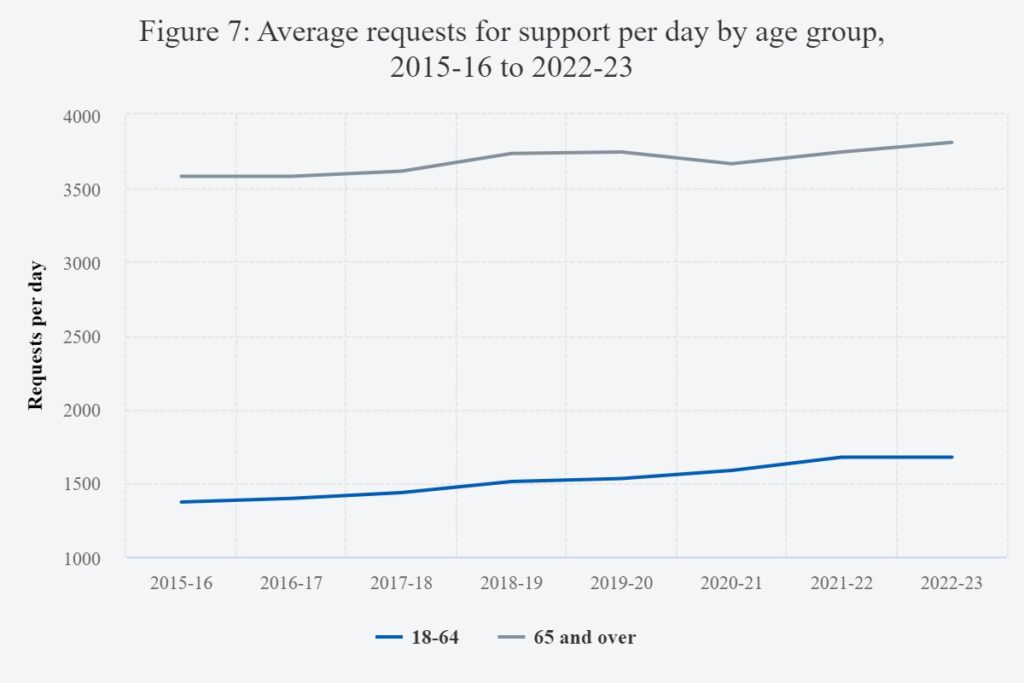
Tips to Handle the Backlog in Adult Social Care Services
Addressing the backlog in adult social care services is a multifaceted challenge, especially in the UK, where demand often outstrips supply. To enhance service delivery and reduce wait times, a combination of strategic planning, innovative technologies, and human-centric approaches is essential. In this article, we'll explore effective tips to handle the backlog in adult social care services, ensuring that those in need receive the support they deserve.
1. Understanding the Scale of the Challenge
The provision of adult social care services in the UK faces an escalating challenge. Recent data reveals that local councils are allocating a substantial portion of their budgets to social care, with some councils spending up to 60% of their total budgets in this area. This heavy investment reflects the growing demand for adult social care services and the increasing costs associated with providing high-quality care.
One of the most significant factors contributing to this challenge is the increasing number of elderly individuals requiring support. The ageing population, coupled with complex care needs, often necessitates specialised services, putting additional strain on resources.
To understand the scale of the backlog in adult social care services, it’s crucial to examine key statistics and data. As of the latest reports, individuals seeking adult social care often face extensive wait times. These delays can have severe consequences for their well-being and quality of life.
- Waiting Times: On average, individuals in need of adult social care services experience wait times that can stretch for several months. These delays not only impact their access to essential care but also exacerbate their existing health conditions.
- Financial Implications: The backlog has significant financial implications. Local councils are confronted with the challenge of allocating a significant portion of their budgets to meet the increasing demand for care. This financial pressure limits their ability to innovate and enhance service delivery methods.
- Number of Individuals Affected: The backlog affects a substantial number of individuals across the UK. It’s estimated that thousands of people are waiting for essential social care services, ranging from personal assistance to residential care.
These statistics underscore the urgency of finding effective solutions to address the backlog and ensure timely care for those in need.

Graph 1: Gross current expenditure on Adult Social Care in England. Gross current expenditure in 2023 was £23.7 billion. This represents an increase of £1.7 billion (7.9%) from the previous year.

Graph 2: Average requests for support per day by age group. In 2022-23 and for the first time there were over 2.0 million requests for support (2,002,055) from new clients received by local authorities. This is an increase of 23,500 (1.2%) compared with 1,978,550 requests for support in 2022-23.
[1] Adult Social Care Activity and Finance Report, England, 2022-23 – NHS Digital
[2] Requests for Support – NHS Digital
2. Effective Tips for Managing Backlog in Adult Social Care Services
To effectively address the backlog in adult social care services, it’s essential to implement best practices and strategies that prioritise efficiency without compromising the quality of care. Here are some key strategies to consider:
- Staff Training and Development: Investing in regular training and providing robust support systems can empower staff to work more efficiently and effectively, reducing errors and improving service quality.
- Resource Allocation: Effective use of resources, including staff time and care materials, can significantly reduce waiting times. Implementing resource management tools and data-driven insights can help in planning and allocation.
- Lean Management Principles: Adopting lean management techniques can help identify and eliminate waste in processes, leading to more efficient service delivery and better resource utilisation.
- Transparent Communication: Clear, consistent communication channels between staff, clients, and their families are vital. This can prevent misunderstandings and ensure everyone is informed about care plans and changes.
- Stakeholder Engagement: Regular engagement with stakeholders, including clients, families, and local communities, can provide valuable feedback and ideas for improvement and help shape more effective care services.
- Technology Utilization: Digital tools and software can streamline many administrative tasks, from scheduling to client record management. Embrace technology as an enabler for streamlined operations.
3. Real-Life Examples of Handling Backlog in Adult Social Care Services
To gain a deeper understanding of how effective strategies can address the backlog in adult social care services, let’s explore real-life examples and case studies. These instances demonstrate how organizations and communities have successfully implemented the discussed approaches, resulting in tangible improvements in care delivery.
Real-Life Example 1: Leicestershire County Council
In Leicestershire County Council, a concerted effort was made to address the backlog in adult social care services. By prioritizing staff training, optimizing resource allocation, and embracing technology, they were able to significantly reduce wait times and enhance the quality of care. Specifically, developed a care technology as an alternative to more traditional packages of care, leading to financial benefits. The project resulted in positive impacts for service users, increased service take-up, and a cultural shift where care workers consider care technology as a first option offer. These efforts align with the broader challenges and trends in adult social care, such as the need to prevent or delay hospitalizations and expensive residential care, as well as the rising demand for care services.
Real-Life Example 2: Kent County Council
In Kent County Council, the challenge of backlog was met with innovation and collaboration. By developing an easy-to-use app to enable people to provide feedback on care navigator services, they were able to enhance independence of residents by identifying the most effective community resources. Overall, this led to a 10% saving on their homecare spend (£2.8m pa) and a delay in uptake of statutory services by 4-6 months (£850k pa).
These real-life examples and case studies serve as practical illustrations of the strategies discussed earlier in the blog post. They demonstrate that with dedication and the right approach, it’s possible to make a meaningful difference in the lives of those in need of adult social care services.
4. Overcoming Common Challenges in Adult Social Care Services
While the strategies outlined in this blog post offer effective solutions for addressing the backlog in adult social care services, it’s essential to acknowledge and address common challenges that organizations may encounter during implementation. By recognizing these challenges and offering guidance on overcoming them, we can better equip care providers and stakeholders to navigate the road ahead.
Challenge 1: Funding Constraints
Many organizations face budget limitations that can hinder their ability to invest in training, technology, and resource optimisation. To overcome this challenge, consider exploring alternative funding sources, forming partnerships with local businesses or philanthropic organisations, and advocating for increased government support.
Challenge 2: Resistance to Change
Resistance to change among staff or within the organization can impede the adoption of new strategies. To address this challenge, foster a culture of open communication, involve staff in decision-making, and provide training and support to help them embrace new approaches.
Challenge 3: Technological Barriers
Implementing digital solutions and technology can be met with technical challenges. Ensure that staff receive adequate training and support and consider collaborating with tech-savvy individuals or organizations to streamline the integration of technology into daily operations.
By proactively addressing these common challenges, organizations can smooth the path toward addressing the backlog and improving the efficiency and quality of adult social care services.
Conclusion
Tackling the backlog in adult social care services requires a balanced approach that combines effective management practices, skilled and supported staff, stakeholder engagement, and innovative use of technology, including AI. By focusing on these areas, we can make significant strides in improving the quality and efficiency of care provided to the elderly population in the UK.
In summary, addressing the backlog in adult social care services is a complex but crucial endeavour. By implementing these strategies and harnessing the power of technology, we can work towards ensuring that essential care services are delivered promptly to those who need them most.
For additional information, please contact Agilisys at info@agilisys.co.uk.





